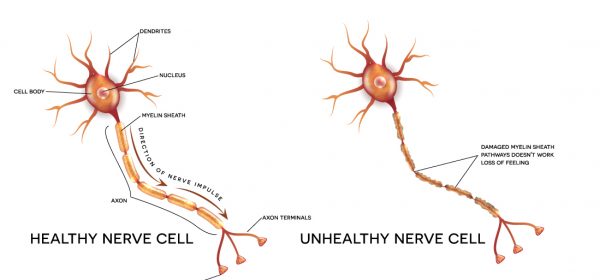What is Neuropathy?

February 12, 2017
Neuropathy refers to the general malfunction of any bodily nerves. Any nerves within the body are at risk of being damaged by neuropathy. Understanding neuropathy is necessary before proceeding with a treatment plan. If you believe that you are suffering from neuropathy, please visit a doctor as soon as possible for a professional diagnosis.
Types of Neuropathy
There are multiple types of neuropathy that can affect people with many different symptoms.
- Peripheral neuropathy – As the most common type of neuropathy, peripheral neuropathy covers any type of neuropathy that takes place outside of the brain or spinal cord. This includes neuropathy that affects feet, legs, fingers, arms, hands or toes. Proximal neuropathy is a subcategory that refers to nerve damage in the hips, thighs or shoulders.
- Cranial neuropathy – Whenever any of the 12 cranial nerves are damaged, the resulting diseases is considered cranial neuropathy. Two types of cranial neuropathy are optic neuropathy and auditory neuropathy. The first type, optic, can impact anything related to sight. The second type, auditory neuropathy, relates to anything is related to hearing.
- Autonomic neuropathy – Any damage to the involuntary nervous system is deemed as autonomic neuropathy. Multiple organs may be affected by autonomic neuropathy.
Symptoms of Neuropathy
Since neuropathy is a term that covers many different types of nerves, it can cause a wide variety of issues in the nervous system. The types of nerves that are affected dictate the symptoms that a patient will experience.
- Sensory nerves – These are the nerves that control sensation. When affected by neuropathy, the patient may experience pain, weakness or tingling in the hands or feet.
- Motor nerves – As the name implies, these are the nerves that control power and movement. Neuropathy can cause these nerves to become weak and fatigued.
- Autonomic nerves – This is the part of the nervous system that controls the organ systems of the body. When impacted by neuropathy, it can cause an increase or decrease in blood pressure or heart rate.
Primary Causes of Neuropathy
Neuropathy can be inherited or acquired later in life. Sometimes it’s difficult for doctors to pinpoint the exact cause of neuropathy. However, there are multiple known causes:
- Systemic disease – This is a disease that can impact your entire body. The most common systemic disease that results in neuropathy is diabetes, however there are many more. Kidney disorders can allow for nerve damaging substances to build up in the blood.
- Drugs – Some prescribed medication can cause neuropathy. Some chemotherapy medicines have been known to cause multiple types of neuropathy. This is also true for HIV medication.
- Excessive alcohol – Drinking too much can cause nerve damage, which can become neuropathy.
- Cancer – Peripheral neuropathy is common with lymphoma and other types of cancer.
- Idiopathic – While not a cause, this is a term to describe those with neuropathy that has no distinct cause.
If you suspect that you are suffering from neuropathy, schedule an appointment with a physician to determine the next best course of action.
